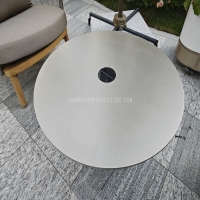Welcome to the website for landscape facilities products and knowledge.
What are the key differences between using cork and rubber for soft-surface landscape tables?
When choosing materials for soft-surface landscape tables, cork and rubber are two popular options, each with unique advantages. Here’s a detailed comparison to help you decide which suits your needs best.
1. Durability and Longevity
Rubber is highly durable, resistant to weather extremes, and can withstand heavy use without cracking. Cork, while naturally resilient, may degrade faster under prolonged UV exposure or heavy loads unless treated with protective coatings.
2. Eco-Friendliness
Cork is a sustainable choice, harvested from renewable cork oak trees without harming the plant. Rubber, often synthetic, has a higher environmental footprint, though recycled rubber options are available.
3. Comfort and Texture
Cork offers a warm, natural feel and slight cushioning, ideal for relaxed outdoor settings. Rubber provides a firmer surface, better suited for high-traffic areas or commercial use.
4. Maintenance Requirements
Rubber is low-maintenance, easy to clean, and resistant to mold. Cork requires periodic sealing to prevent moisture absorption and maintain its appearance.
5. Aesthetic Appeal
Cork’s organic, rustic look blends seamlessly with natural landscapes. Rubber, available in various colors and finishes, offers more design flexibility for modern or urban spaces.
In summary, cork excels in sustainability and aesthetics, while rubber wins in durability and practicality. Your choice depends on priorities like environmental impact, usage frequency, and design preferences.
Related search:

Recommendation
Outdoor stainless steel table with solar-powered ambient lighting feature - excellent design.